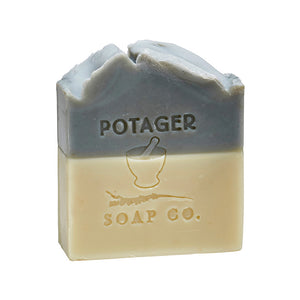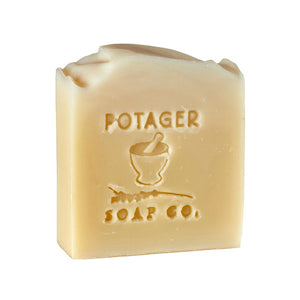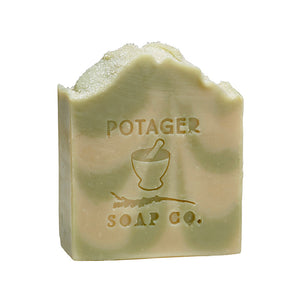The Essential Reasons to Prioritize Your Skin Care
May 24, 2024
At Potager Soap, we take skin care incredibly seriously. Our skin, the body's largest organ, is a vital shield against harmful environmental factors, and maintaining its health is essential for overall well-being.
A comprehensive skin care routine doesn't just enhance your appearance—it transforms your skin's texture, prevents common issues, and boosts your confidence.
With a passion for nature's purest ingredients, we believe that using natural and organic products is the key to unlocking truly healthy, radiant skin. Join us on this journey to prioritize your skin's health with the utmost care and dedication.
Skin as a Protective Barrier
Our skin is the first line of defense against pollutants, bacteria, and UV radiation. It prevents harmful substances from entering the body and retains moisture, ensuring that the body's internal environment remains balanced. Taking care of our skin is, therefore, not just about aesthetics but about protecting our overall health.
The Role of a Healthy Skin Barrier
A healthy skin barrier is essential for maintaining hydration and preventing irritants from causing damage. When the skin barrier is compromised, it can lead to various issues, including dryness, sensitivity, and increased susceptibility to infections. Regular skin care helps in reinforcing this barrier, keeping the skin resilient and capable of performing its protective functions.
Preventing Skin Issues
A proper skin care routine can prevent common skin problems such as acne, eczema, and premature aging. Cleansing, exfoliating, moisturizing, and protecting the skin from the sun are fundamental steps that can help maintain skin health and prevent these issues.
Boosting Confidence and Well-being
Healthy skin can significantly impact an individual's self-esteem and overall well-being. When skin looks good, people feel better about themselves, which can positively affect their mental health and social interactions. This underscores the psychological benefits of a good skin care regimen.
Understanding Natural and Organic Products
Natural skin care products are derived from natural sources without the use of synthetic chemicals, while organic products are made from ingredients that are grown without pesticides, synthetic fertilizers, or genetically modified organisms.
These products are often free from harmful additives like parabens, sulfates, and artificial fragrances.
Gentle on the Skin
Natural and organic products are typically gentler on the skin compared to their synthetic counterparts. They are less likely to cause irritation, making them suitable for all skin types, including sensitive skin.
Environmentally Friendly
Organic farming practices and natural ingredients are better for the environment. They reduce the chemical load on the planet and promote biodiversity. By choosing natural and organic skin care products, consumers can contribute to a more sustainable and eco-friendly beauty industry.
Rich in Nutrients
Natural and organic products often contain high levels of beneficial nutrients, such as vitamins, antioxidants, and essential fatty acids. These ingredients nourish the skin, promoting a healthy, radiant complexion.
Avoiding Harmful Chemicals
Conventional skin care products may contain harmful chemicals that can be absorbed into the bloodstream and cause adverse effects. Natural and organic products minimize exposure to these potentially dangerous substances.
Popular Natural Ingredients and Their Benefits
Aloe Vera
Aloe vera is known for its soothing and hydrating properties. It can help reduce inflammation, treat sunburn, and provide a moisture boost to the skin.

Coconut Oil
Coconut oil is an excellent moisturizer that can penetrate deep into the skin. It has antibacterial and antifungal properties, making it beneficial for treating various skin conditions.
Shea Butter
Shea butter is a rich source of vitamins A and E and essential fatty acids. It provides deep hydration and helps in healing dry and cracked skin.
Green Tea
Green tea is packed with antioxidants that protect the skin from free radical damage. It also has anti-inflammatory properties that can help reduce redness and irritation.
Understanding Labels and Certifications
When choosing natural and organic products, it is essential to understand labels and certifications. Look for certifications from reputable organizations such as USDA Organic, EcoCert, Baystate Certified, and COSMOS. These certifications ensure that the products meet strict standards for natural and organic content.
Building a Natural Skin Care Routine
Cleansing
Cleansing is the first step in any skin care routine. It removes dirt, oil, and impurities from the skin, allowing it to breathe and function properly. Opt for natural cleansers that are free from harsh detergents and artificial fragrances.
Exfoliating
Exfoliating helps to remove dead skin cells, promoting a smoother and more radiant complexion. Natural exfoliants like sugar, salt, and oatmeal can be effective without causing irritation.
Toning
Toning helps to balance the skin's pH and prepare it for moisturizing. Natural toners like witch hazel and rose water can soothe and refresh the skin without stripping it of its natural oils.
Moisturizing
Moisturizing is crucial for maintaining skin hydration and preventing dryness. Choose natural moisturizers that contain nourishing ingredients like shea butter, jojoba oil, and aloe vera.
Sun Protection
Protecting the skin from UV damage is essential for preventing premature aging and reducing the risk of skin cancer. Look for natural sunscreens that use mineral-based ingredients like zinc oxide and titanium dioxide.
The Role of Diet and Lifestyle in Skin Health
Eating a Balanced Diet
A healthy diet can significantly impact skin health. Foods rich in vitamins, minerals, and antioxidants can nourish the skin from the inside out. Include plenty of fruits, vegetables, and healthy fats in your diet for optimal skin health.
Staying Hydrated
Drinking plenty of water is essential for keeping the skin hydrated and flushing out toxins. Aim for at least eight glasses of water a day to maintain skin moisture and elasticity.
Getting Enough Sleep
Sleep is crucial for skin repair and regeneration. Aim for 7-9 hours of quality sleep each night to allow your skin to recover and rejuvenate.
Managing Stress
Stress can negatively impact skin health, leading to issues like acne and premature aging. Practice stress-management techniques such as meditation, yoga, and deep breathing exercises to keep stress levels in check.

Addressing Common Skin Concerns with Natural Solutions
Acne
Acne is a common skin concern that can be managed with natural remedies. Tea tree oil, witch hazel, and aloe vera are known for their antibacterial and anti-inflammatory properties, making them effective in treating acne.
Dry Skin
Dry skin can benefit from natural moisturizers like shea butter, coconut oil, and avocado oil. These ingredients provide deep hydration and help to repair the skin barrier.
Eczema
Eczema is a chronic skin condition that can be alleviated with natural treatments. Colloidal oatmeal, chamomile, and calendula are known for their soothing and anti-inflammatory properties, making them beneficial for eczema-prone skin.
Hyperpigmentation
Hyperpigmentation can be addressed with natural ingredients like vitamin C and licorice extract. These ingredients can help to brighten the skin and reduce the appearance of dark spots.
The Future of Natural and Organic Skin Care
Innovations in Natural Ingredients
The natural and organic skin care industry is continually evolving, with new ingredients and formulations being developed to meet consumer demand. Innovations in natural preservatives, plant-based actives, and sustainable packaging are paving the way for more effective and eco-friendly products.
Increasing Consumer Awareness
Consumers are becoming more informed about the benefits of natural and organic products. This increasing awareness is driving demand for clean beauty products and encouraging brands to be more transparent about their ingredients and sourcing practices.
Regulatory Changes
Regulations surrounding natural and organic products are becoming stricter, ensuring that products labeled as such meet specific standards. This is helping to eliminate greenwashing and build consumer trust in the natural and organic skin care market.
Embracing a Natural Skin Care Lifestyle
Simplifying Your Routine
A natural skin care routine does not have to be complicated. Focus on using a few high-quality, effective products that meet your skin's needs. This can simplify your routine and make it easier to stick to.

DIY Skin Care
Creating your own skin care products using natural ingredients can be a fun and cost-effective way to care for your skin. Simple recipes using ingredients like honey, yogurt, and essential oils can provide effective results without the need for synthetic additives.
Supporting Ethical Brands
Supporting brands that prioritize ethical sourcing, fair trade practices, and sustainability can make a significant impact. By choosing products from such brands, you can contribute to a more ethical and sustainable beauty industry.
Skin care is a vital aspect of overall health and well-being. Using natural and organic products can enhance skin health, protect against environmental damage, and prevent common skin issues. These products offer numerous benefits, including being gentle on the skin, environmentally friendly, and rich in nutrients. By incorporating natural ingredients into your skin care routine and adopting a holistic approach to skin health, you can achieve a radiant, healthy complexion.
At Potager Soap, we believe in caring for your skin with natural oils and botanicals to maintain quality hygiene and improve skin health. Our commitment to using the finest natural ingredients ensures that our products are not only effective but also safe for you and the environment. Embrace the power of nature and experience the difference that natural and organic skin care can make for your skin.



